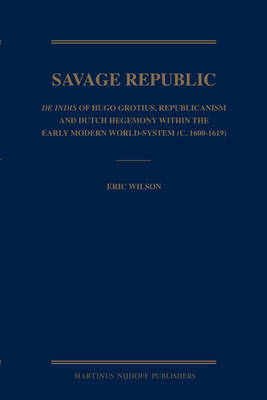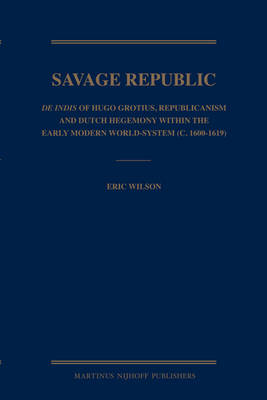
- Afhalen na 1 uur in een winkel met voorraad
- Gratis thuislevering in België vanaf € 30
- Ruim aanbod met 7 miljoen producten
- Afhalen na 1 uur in een winkel met voorraad
- Gratis thuislevering in België vanaf € 30
- Ruim aanbod met 7 miljoen producten
Zoeken
Savage Republic: de Indis of Hugo Grotius, Republicanism and Dutch Hegemony Within the Early Modern World-System (C. 1600-1619)
Eric Wilson
Hardcover | Engels
€ 381,95
+ 763 punten
Omschrijving
Intended for the professional academic and graduate student, this book is the first to utilize the methodology of "New Stream" legal scholarship in an extended critical "exegesis" of Hugo Grotius' De Indis (c.1604-6). De Indis is predicated upon a two-fold discursive strategy: (i) investing "private" Trading Companies with "public" international legal personality, and (ii) collapsing the distinction between "private" and "public" warfare. Governing the operation of textual interpretation is De Indis' status as a republican treatise juridically legitimating an early modern Trans-National corporation (the VOC) that served as an agent of a "primitive" system of global governance, the early Capitalist World-Economy. The application of New Stream scholarship reveals that the republican signature of De Indis consists of a discursive "micro-oscillation" between the "thick" ontology of Late Scholasticism ("Utopia") and the "thin" ontology of Civic Humanism ("Apology") wholly appropriate to the governance requirements of the embryonic Modern World-System.
Specificaties
Betrokkenen
- Auteur(s):
- Uitgeverij:
Inhoud
- Aantal bladzijden:
- 533
- Taal:
- Engels
Eigenschappen
- Productcode (EAN):
- 9789004167889
- Verschijningsdatum:
- 1/06/2008
- Uitvoering:
- Hardcover
- Formaat:
- Genaaid
- Afmetingen:
- 165 mm x 251 mm
- Gewicht:
- 1020 g

Alleen bij Standaard Boekhandel
+ 763 punten op je klantenkaart van Standaard Boekhandel
Beoordelingen
We publiceren alleen reviews die voldoen aan de voorwaarden voor reviews. Bekijk onze voorwaarden voor reviews.








